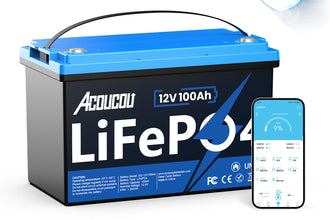

When it comes to setting up an RV electrical system, one of the key decisions that needs to be made is the choice of voltage. The most common options include 12V, 24V, and 48V systems, each offering its own set of advantages and disadvantages. Understanding the differences between these options can help RV owners make an informed decision that best suits their needs. In this article, we will explore the advantages and disadvantages of 12V, 24V, and 48V RV systems.
What Does an RV Solar System Need?
The components of an RV solar system usually include solar panels, a controller, a battery bank, an inverter, and some necessary cables and wiring.
- Solar panel: Monocrystalline panel and polycrystalline panel
- Controller: PWN and MPPT
- Inverter: Pure sine wave inverter
- Battery: LiFePO4 battery and lead-acid battery
If you want to know more, the blog Let’s Create a Simple Solar System with Acoucou LiFePO4 Batteries may help you.

Which System Is Suitable For My RV?
12 System
The 12V system is the most common in RV systems. It has developed for many years, with mature technology and numerous electrical devices that are compatible with it.
Pros:
- Common and widely available components: 12V components are the most common in the RV industry, so finding replacement parts and accessories is relatively easy, and as a result, there is a wide range of 12V appliances and components readily available in the market.
- Lower cost: 12V systems typically have lower component costs compared to higher voltage systems.
- Simplicity: 12V systems are relatively simple to install and maintain, making them a popular choice for many RV owners. Because most RVs use a 12V system, there will be more relevant information available online.
Cons:
- Limited power capacity: 12V systems may not be suitable for high-power applications, such as large appliances or heavy-duty electronics.
- Inverter Limitation: The maximum inverter powered by a 12V system is 3000W.
- Thicker cables: The instantaneous starting current of inductive loads such as air conditioning is 3 to 5 times the rated current, which requires thicker cables.
24 System
It is less common in RVs but gaining popularity for certain applications. Some larger RVs or motorhomes may use a 24V system to power heavier loads or for more efficient power distribution.
Pros:
- Increased Power Capacity: 24V systems can support higher power capacity, allowing for the use of more demanding appliances and electronics.
- Efficiency: According to P=UI, under a certain electrical power, voltage and current are inversely proportional, with higher voltage indicating lower current. According to Joule's law, when a current passes through a conductor, it will generate heat and lose some power. The power loss caused by heat generation is directly proportional to the square of the current and the product of resistance, which indicates that the larger the current, the more heat is lost during power generation, and the lower the efficiency of utilizing electrical energy. Higher voltage systems generally offer better efficiency in power transmission and conversion than 12V system.
Cons:
- Availability of Components: While 24V components are available, they may not be as readily accessible as 12V components, and the selection may be more limited.
- Cost: Setting up a 24V system may involve higher initial costs compared to a 12V system.
48 System
Less common in traditional RV setups, but may be found in some specialized or high-end applications and is usually used in larger energy systems.
Pros:
- High power capacity: 48V systems can support even higher power loads, making them suitable for large and energy-intensive RV setups.
- Efficiency: Higher voltage systems like 48V can be more efficient for certain applications compared to lower voltage systems.
- Larger Inverter: 48V system can use 6000W or 8000W inverters and solves the problem of using high-power electrical appliances simultaneously.
Cons:
- Limited Availability: 48V components and appliances are less commonly available in the market, which may limit options for RV owners.
- Cost:Setting up and maintaining a 48V system can involve higher costs compared to lower voltage systems.
How Acoucou Batteries To Help You

- High Energy Density and Lightweight: LiFePO4 batteries have a higher energy density compared to lead-acid batteries, meaning they can store more energy in a smaller and lighter package. LiFePO4 battery is much lighter than lead-acid battery. Acoucou LiFePO4 12V 100Ah is 29.98 lbs nearly 1/3 of the weight of the same type of lead-acid battery. Therefore, they can reduce the weight of the RV compared to lead-acid batteries.
- Longer Cycle Life: LiFePO4 batteries can withstand a large number of charge/discharge cycles, making them durable and long-lasting. It can generally last for 7 to 10 years of use. Acoucou LiFePO4 battery has more than 6000 cycles and a 10-year life.
- Maintenance-Free: Unlike lead-acid batteries, LiFePO4 batteries do not require regular water replenishment.
- Fast Charging: These batteries can be charged at a faster rate compared to lead-acid batteries, reducing downtime. There are 3 flexible charging ways of Acoucou for your energy storage.
- Safety and Eco-Friendly: LiFePO4 batteries are the safest battery type available today. BMS can protect the battery better and make it last longer. They have no cobalt or rare earth elements. Being built with non-toxic materials. Acoucou LiFePO4 battery has a built-in BMS that people can check the situation of batteries through Bluetooth in the APP.
- Wide Operating Temperature Range: They can operate effectively in a broad range of temperatures and can be used for various scenarios. Acoucou LiFePO4 batteries can work between -20 ℃ and 45 ℃.
Acoucou has many different types of batteries to meet your needs: 12V 50/100/200/300Ah and 24V 100Ah. The picture can tell you how much capacity battery is needed for different RVs for reference.

In conclusion, the choice between 12V, 24V, and 48V RV systems depends on the specific power needs and limitations of the individual RV owner.










